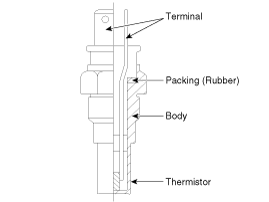 Hyundai Veloster: Engine Coolant Temperature Sensor (ECTS). Description and Operation
Hyundai Veloster 2011-2017 Service Manual / Fuel System / Engine Control System / Engine Coolant Temperature Sensor (ECTS). Description and Operation
Hyundai Veloster: Engine Coolant Temperature Sensor (ECTS). Description and Operation
Hyundai Veloster 2011-2017 Service Manual / Fuel System / Engine Control System / Engine Coolant Temperature Sensor (ECTS). Description and Operation
Hyundai Veloster 2011-2017 Service Manual / Fuel System / Engine Control System / Engine Coolant Temperature Sensor (ECTS). Description and Operation
Description
Engine Coolant Temperature Sensor (ECTS) is located in the engine coolant
passage of the cylinder head for detecting the engine coolant temperature. The
ECTS uses a thermistor that changes resistance with the temperature.
The electrical resistance of the ECTS decreases as the temperature increases,
and increases as the temperature decreases. The reference +5V is supplied to
the ECTS via a resistor in the ECM. That is, the resistor in the ECM and the
thermistor in the ECTS are connected in series. When the resistance value of
the thermistor in the ECTS changes according to the engine coolant temperature,
the output voltage also changes.
During cold engine operation, the ECM increases the fuel injection duration
and controls the ignition timing using the information of engine coolant temperature
to avoid engine stalling and improve drivability.

 Intake Air Temperature Sensor (IATS). Repair procedures
Intake Air Temperature Sensor (IATS). Repair procedures
Inspection
1.
Turn the ignition switch OFF.
2.
Disconnect the IATS connector.
3.
Measure resistance between th ...
 Engine Coolant Temperature Sensor (ECTS). Specifications
Engine Coolant Temperature Sensor (ECTS). Specifications
Specification
Temperature
Resistance (kΩ)
°C
°F
-40
-40
48.14
-20
-4
...
See also:
Instrument Cluster. Schematic Diagrams
Circuit Diagram
...
Wheel. Repair procedures
Hub Nut Tightening Sequence
Tighten the hub nuts as follows.
Tightening torque :
88.3 ~ 107.9N.m (9.0 ~ 11.0kgf.m, 65.1 ~ 79.6lb-ft)
...
Engine compartment
Gasoline 1.6 GDI
1. Engine coolant reservoir 2. Engine oil filler cap 3. Brake/clutch* fluid
reservoir 4. Positive battery terminal 5. Negative battery terminal 6. Fuse
box 7. Air cleaner 8. Ra ...
Categories
- Hyundai Veloster Manuals Home
- Hyundai Veloster 2010-2017 Owner's Manual
- Hyundai Veloster 2010-2017 Service Manual
© 2011-2026 Copyright www.hvmanual.com
